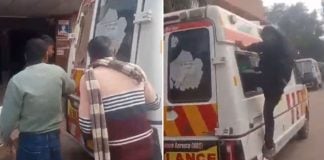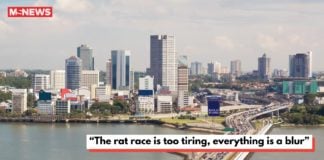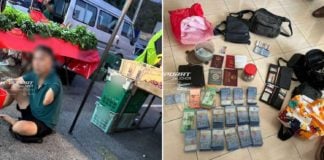Reverend Miak Siew Says Pink Dot Still Holds Relevance Due To Social Stigma
Reverend Miak Siew isn’t exactly your typical church leader — the executive pastor of Free Community Church (FCC), an LGBTQ-affirming church, is one of the few openly LGBTQ pastors in Singapore.

The non-denominational church, started by a group of queer Christians in 2003, has been denounced over the years as a ‘cult’ and heretical to Christianity.
However, that hasn’t stopped Reverend Siew from seeking to help others like him reconcile their faith with their sexuality through his work.
He firmly believes that LGBTQ folks face many challenges in society that are yet to be tackled — even after the repeal of Section 377A last year.
Non-traditional families are still being shut out of the mainstream, for example. And various policies are disadvantageous to not just them, but also heterosexual singles and other disenfranchised members of society.
Growing up & coming out
The 90s was a very different time for LGBTQ folks. Unlike today, where people are becoming more accepting of different lifestyles, most lived in fear of coming out or expressing their sexuality.
Reverend Siew was no different. It took him a long time to come to terms with his sexuality because he always thought God did not accept gay people.
“Growing up, I thought I couldn’t be Christian and gay,” the 48-year-old shared. “I thought God hated gay people and that it was something I needed to change.”

Additionally, coming out is always a risk for anyone. Rejection, abandonment, and fear of losing the ones they care about are some concerns he and other queer people have had.
But when he came out to his best friend in his twenties, he felt accepted.
That friend told him, “Did you murder my parents? Did you rape my sister? No? Then what could you have done that’d make me stop being friends with you?”
Though coming out to his family was a larger hurdle to overcome, Reverend Siew happily shared that they came to accept his sexuality over time.
His partner is even present when they have family gatherings and overseas trips together.
How Reverend Miak Siew answered the call to be a pastor
Just as he did not believe he could be Christian and gay, Reverend Siew never once thought he could become a Christian leader, let alone a pastor.
But after attending FCC as a member, he found himself stepping up as he felt the people that the church wanted to help weren’t getting as much support.
In 2007, he thought to himself about the people he was helping at his support group three times a week and wondered if he could help even more out there.
“There were people who came who were broken or suicidal, and they found some level of healing and affirmation here,” Reverend Siew recalled.
“By coming, they could witness other LGBTQ folks who are further down that journey and think, ‘I can get there.’”
Reverend Siew fought against the idea of becoming a pastor internally and even put it aside for a while. However, the thought kept returning.
When he spoke to the late Reverend Yap Kim Hao, the first Asian bishop of the Methodist Church in Singapore and Malaysia and the pastoral advisor at FCC, he was told, “I think it is a calling, and I don’t think you should ignore it.”
These thoughts sowed the seeds for him to eventually quit his corporate job, sell his apartment, and move to the United States to attend a seminary.
Upon his return in 2011, he took up the executive pastor position at FCC and hasn’t looked back.
A safe space for a community rejected by others
FCC began as a group of queer Christians who wanted to practise their faith but had been excommunicated or shunned by other churches.
Though not everyone who’s come through FCC’s doors stayed, Reverend Siew believes people have the freedom to choose the church they’d like to attend.
The key to FCC is that it welcomes everyone. It’s in the name – FREE stands for “First Realise Everyone’s Equal”.
Approximately 75% of its members are queer, but there are others who are heterosexual as well.
For example, a member who was refused baptism by a different church because they were a yoga instructor was baptised later at FCC.
As such, FCC offers support not just for the LGBTQ community but for everyone.
Dealing with criticism & backlash
Sadly, FCC and Reverend Siew have faced numerous instances of backlash over the years, be it from members of other churches or those who disagree with their teachings.
One even called them a ‘cult’.
Reverend Siew said, “Those who send emails are cowards. They can only hide behind an email or social media account and say whatever they want without fear of reprisal.”
However, in person, people behave very differently.
“Singaporeans are conflict-avoidant — they don’t like to disagree face-to-face,” he mused.
“I think that’s the toxicity of social media, that people can hide behind their accounts. I think what would help all of us is if we sat down and ate a meal together.”
Though he’s fine with disagreements, Reverend Siew does have an issue with misinformation, which led to him penning an op-ed in The Straits Times (ST) last year in response to an earlier letter expressing concern about the supposed negative effects the 377A repeal would have on children.
He noted that the “gay lifestyle” many detractors speak about simply does not exist.
“Nobody is encouraging children to be ‘sexually experimental since all sexual behaviours are equal’,” he pointed out in his letter.
He feels that much of the homophobia stems from a fear of what people do not understand.
“If they sat down with an LGBTQ individual, they’d realise we’re not much different from others . . . and we’re not the sex-crazed maniacs the media likes to portray us as.”
Fortunately, there is progress. Reverend Siew is happy that over the years, he has been invited to dialogues featuring other voices in the Christian community, some of whom are against FCC’s position.
Though they don’t see eye to eye, he believes such discussions are better than having flame wars online, where people are much less likely to view the other side as human.
Pink Dot is still relevant today
This year, Pink Dot is in its 15th edition and is the first one since 377A was repealed.

Image courtesy of Pink Dot SG
Though this would normally be something to celebrate, Reverend Siew did not exactly feel that way.
“It felt bittersweet,” he admitted.
“When I went home and thought about it [after the announcement], I did not feel elated.”
The pastor likened the feeling to “a can of Coke that was left out overnight”. “It’s not cold anymore, and the fizziness is gone. It tastes flat. [The repeal] was way past [due].”
“I think about the people who are no longer here, the ones before me — some because they were old and passed away, some because they took their own lives.”
“I know one too many suicide cases. Not that 377A caused it, but societal views of them, the lack of acceptance, and the struggles within.”
Support for parents also important
Despite the repeal of 377A, Reverend Siew believes the current situation hasn’t changed much.
Many prevailing societal views remain. This is why Pink Dot still holds relevance.

“Pink Dot has always been about the freedom to love,” he said. “This year, there is a focus on the family, and showcasing them is important.”
As Reverend Siew once heard someone say, “When we come out, our parents are the ones who go into the closet.”
He elaborated that parents of queer individuals often feel isolated because their friends share anti-LGBTQ material in their WhatsApp groups. And they don’t dare to say anything or speak up.
“Parents are the ones beginning to find support,” he mused. “I think that’s the key.”
All in all, Reverend Siew would go so far as to say that he feels “more patriotic during Pink Dot than National Day”.
“I feel that these people have more passion for what Singapore should look like in the future,” he explained.
That we learn to respect one another and to live in harmony even though we disagree — in spite of our differences.
The fact that he is gay does not faze Reverend Siew – after all, it is who he is. And he strives to treat others equally, the way he’d like to be treated.
“I live my life in a way that invites people to see God through me… they’re drawn to the faith because of what I do.”
Equality before the law a more pertinent issue to Reverend Miak Siew
Though the Constitution has been amended to protect the definition of marriage — that it remains one between a man and a woman — from legal challenges, Reverend Siew thinks that there are other issues that are more important.

Source: Sandy Millar on Unsplash, for illustration purposes only
Reverend Siew himself has even officiated same-sex marriages at FCC, even though they are not legally recognised in Singapore.
“The law isn’t going to stop them. They just want to celebrate their love with the community and to step forward to commit to one another before God, their friends, their family, and take their vows,” he explained.
Now, the legal and civil aspects — how it affects paperwork — are more pertinent questions to Reverend Siew.
For example, a person may be denied from seeing their partner who is critically ill in hospital because they’re not legally recognised as spouses.
There are occasions where, Reverend Siew shared, families who disapprove of their relationship prevent such partners from seeing their partner in hospital simply because they’re queer.
The pertinent aspect is equality before the law — like what the national pledge states.
Speaking on the argument about how allowing same-sex couples to purchase houses may “take away” from other buyers, he put forth this question:
“Are you saying that some deserve HDB flats more than others? That’s a very me-centred view.”
“But I hope everyone has the same access to housing, benefits, and everything else.”
This extends not just to LGBTQ folk, he thinks, but also to other disenfranchised members of society, such as migrant workers, the elderly, and others who’ve fallen through the cracks.
Affirming all life equally
LGBTQ matters are not the only ones Reverend Siew has concerns for.
Equality, rather, is the issue he is looking to address, especially since the LGBTQ community has come a long way from the 90s and 2000s when there was a real fear of being raided by the police at clubs.
Though Singapore isn’t quite there yet when it comes to equality, Reverend Siew still thinks there is much to celebrate, as the Little Red Dot is a racially and religiously diverse country.
He has Taoist and Muslim neighbours, but he will not hesitate to help them should they be in need. That, he feels, is more important than drawing racial and religious lines.
Hence the patriotism he feels at Pink Dot, where everyone celebrates the freedom to love.
“How do you love? How do you love your neighbour? How do you do justice? How do you manifest compassion?” Reverend Siew asks. “It [goes back to] what Jesus does – what have you done for the least amongst us?”
For those who do not believe Christianity can co-exist with being gay, Reverend Miak Siew would like to challenge that.
Know other interesting or inspirational individuals you’d like to see featured? Get in touch with us via email at news@mustsharenews.com.
Featured image by MS News. Photography by Iskandar Rossali.










